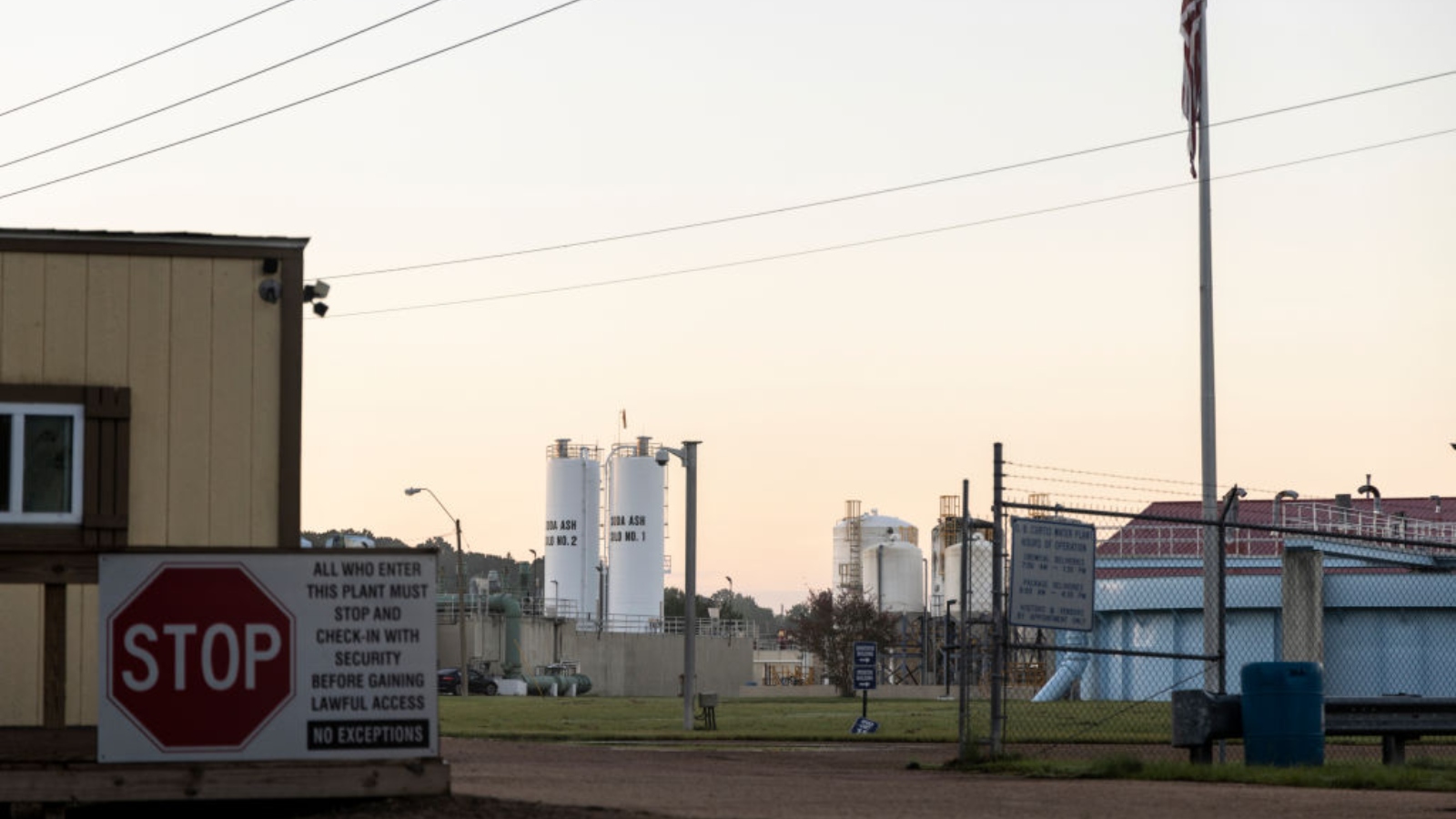One year after the water system in Jackson, Mississippi, failed during heavy flooding — precipitating one of the highest-profile municipal public health crises in recent U.S. history — officials are telling residents that their water is safe to drink. But these claims have failed to restore Jacksonians’ trust in the system: Last week, two local advocacy organizations filed an emergency petition with the Environmental Protection Agency, or EPA, requesting interim relief from persistently poor water quality and a greater degree of public involvement in plans to update the infrastructure.
The petition follows a press conference in mid-June, during which Jackson Mayor Chokwe Antar Lumumba announced a new initiative to distribute water filters to customers of the city’s beleaguered water system.
The federal government had been generous in providing critical funding to repair the system, he said, “but none of this will make any difference if we don’t restore the confidence within our residents,” many of whom were still buying bottled water. Providing filters, particularly to vulnerable people like pregnant women and families with young children, might help convince residents to use their taps again, he reasoned.
The speech landed him in federal court a week later, where a judge expressed concern that his comments contradicted the progress that had been made since the court had appointed a third-party manager, Ted Henifin, to oversee the city’s water system after its treatment plants failed last August.
“There is no health risk drinking the water that I’m aware of,” Henifin told the court on June 21. “We really need to be careful with messaging about the water.”
These assurances seem to contradict the experiences of many Jackson residents. In court testimony and interviews with Grist, residents described chronic odors and discoloration in their tap water, which has persisted even after the water manager’s remarks in June. In the petition filed last week, local groups also claimed that officials have failed to adequately account for numerous sources of lead and bacteria that could be contaminating the city’s water supply.
“Due to inadequate corrosion control, the downplay of historical lead contamination risk, failure to identify the locations of lead service lines, and the continued delay in rehabilitating microbial treatment processes, Jacksonians have no confidence in [Henifin’s] sweeping statements that Jackson’s tap water is safe for all,” the petition read. (The EPA has not yet responded publicly to the petition; when approached to comment for this story, Lumumba’s office referred Grist to Henifin, who did not respond to requests for comment.)
Jackson made national headlines last August after torrential rain caused the pumps at its main water treatment facility to fail, forcing local officials to distribute bottled water to the city’s 180,000 people. But the problem long predates that high-profile event. Jackson’s residents have endured years of low-pressure taps and rolling notices recommending that they boil their water before use. In March 2020, the EPA issued an emergency order warning that the water system could contain elevated levels of bacteria such as E. coli. Four years before that, state officials identified elevated lead levels in the drinking water.
The problem has its roots in decades of disinvestment and discriminatory neglect. After Congress passed the 1964 Civil Rights Act, which cemented the integration of schools and public spaces, white residents began to leave town. Between 1980 and today, the population of white residents dropped from 52 percent to 15 percent. Today, Jackson is more than 80 percent Black and 1 in 4 people live in poverty, according to data from the U.S. Census.
The eroded tax base has made it difficult for city officials to perform much-needed repairs on the city’s water system, parts of which are more than a century old. Donald Cohen, executive director of the nonprofit research group In the Public Interest, told Grist that many poor cities around the country struggle to upgrade their water systems, because residents cannot afford high utility rates, and the tax base is insufficient to supplement that revenue.
In Jackson, matters are made worse by a growing antagonism between Republican Governor Tate Reeves and Lumumba, the Democratic mayor. Prior to becoming governor, Reeves used his power as state treasurer to block efforts to update the capital city’s infrastructure. As governor, he has routinely rejected legislation that would raise money for water-system improvements. (The governor’s office did not respond to multiple requests for comment.)
“There’s a political component to what’s going on in Jackson,” said Cohen. “It’s a red war on a blue city, and it’s a white war on a Black city. Both of those things are true.”
After Jackson’s pumps failed last August, a federal court appointed Henifin, an engineer by training, to oversee the city’s water system. Lumumba has called Henifin “instrumental” in lending his expertise to repair the water system, and advocates that Grist spoke to said they had felt hopeful that matters would improve when he entered the picture. However, they quickly felt boxed out of the process and frustrated by what they perceived as a lack of transparency.
“There is a sense of you’re giving all this power to one person without including people who are from here in this process,” said Brooke Floyd, co-director of the Jackson People’s Assembly at the People’s Advocacy Institute, one of the organizations involved in the petition. During a public meeting in March, Henifin said that the court had given him “really really broad authority, probably more than I would have given myself.” Earlier this month, Henifin was also put in charge of the city’s sewer system, which has at least 215 leaks that pour wastewater into the streets of some neighborhoods.
In their letter to the EPA, the petitioners allege that Henifin has repeatedly failed to meaningfully engage the community, which has resulted in decisions that are against the wishes of Jacksonians, such as taking steps towards privatizing the water system. Earlier this year, he incorporated JXN Water Inc., the body formed to overhaul the city’s water system, effectively shielding it from public disclosure laws. Research has shown that private water systems have, on average, better water quality than public utilities, but they tend to be more costly to customers and more opaque, both factors that could harm officials’ efforts to restore trust in the Jackson community.

A section of the petition addresses Henifin’s statements to the court in June about the water being safe to drink. Floyd told Grist that the same week that Henifin made those claims, the water in her tap was discolored and “stuff was floating in it.” Her family has had to rely on huge water jugs that they buy from Office Depot — a luxury, she added, that many households can’t afford.
In a declaration submitted to the EPA alongside the petition last week, Jackson resident Danyelle Holmes said that every few months, there comes a week when her tap water runs brown and smells like eggs. During a court hearing in July, another resident said that when she leaves town, her and her son’s eczema improves. Shemeka Cavett, who’s lived in Jackson all her life, told Grist that all summer long, she’s filled two garbage bags a week with emptied water bottles. Sometimes, she said, her tap water is the color of tea. When she washes her face with it, she breaks out.
“I still don’t trust it after boiling it,” she said. “If the water is a different color, you can’t get that out.”
The poor water quality could be stemming from multiple sources, the petitioners wrote. Old hookups and bad plumbing in the city’s water distribution network could be leaching lead into some neighborhoods’ tap water, but a lack of access to sampling data has kept residents in the dark about the degree of their potential exposure. As of Henifin’s last quarterly report, the city’s main water treatment plants still did not have optimal corrosion control equipment, an important safeguard against lead contamination.
Last month, JXN Water Inc. reported two water quality violations at that facility to the state. In 2020, the EPA issued an emergency order stating that Jackson’s water system had failed to meet federal filtration and disinfection standards, elevating the risk of bacteria such as E. Coli and Giardia in local taps. In his latest report, Henifin has said that work on the local filtration system is ongoing, but that no completion date could be established.
A lack of access to clean water disrupts almost every aspect of life, said Makani Themba, a local activist. When the water quality is low, people are scared to shower or wash their hands often. One recent study connected boil water alerts in Jackson to higher rates of unexcused absences in schools. Pregnant people and children are particularly vulnerable to the lead exposure, while the elderly and immunocompromised are at a greater risk for microbial contamination. The advocates’ petition suggests that in light of these risks, residents with compromised water be given bottled water or temporary relocation funds.
“Water is life,” Themba told Grist. “That’s really why it was important to file this emergency petition to seek some relief while the residents of Jackson are going through all this.”
Federal relief is on the horizon, but it won’t be nearly enough to meet residents’ needs. In June, President Biden announced that Jackson will be receiving $115 million to improve its water system. The funds are part of a wider $600 million package approved by Congress in the latest federal budget. The money will be used for a range of improvements including fixing leaks in the pipes and ensuring adequate pumping to keep a safe level of pressure in taps. The distribution of funds will be overseen by the EPA under the Safe Drinking Water Act. But Mayor Lumumba has estimated that it would take approximately $2 billion to completely overhaul the city’s water system.
EPA Administrator Michael Regan visited Jackson in November 2021 on his “Journey to Justice tour,” a survey of communities across the South dealing with issues of environmental justice, a term that refers to the disproportionate levels of pollution experienced by low income people and communities of color. Floyd recalls meeting Regan during the tour, and said that his visit was an opportunity for places like Jackson to have a platform to hold regulators accountable. But now, she added, the question is whether they will get the job done.
Is the federal government’s action “just going to be performative, or is environmental justice really going to be served?” she wondered aloud. “It’s on the community and the people to really make sure that they follow through.”



